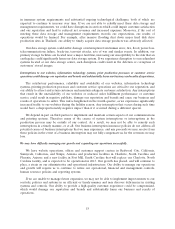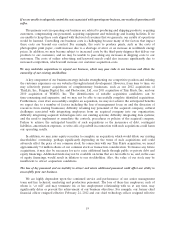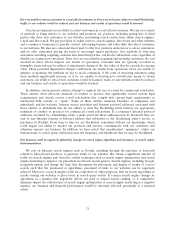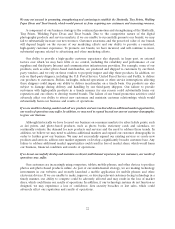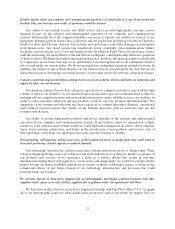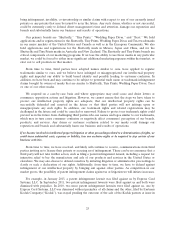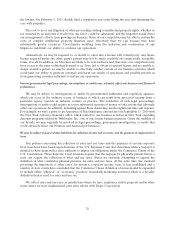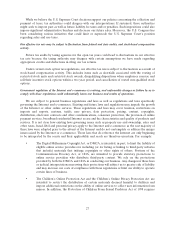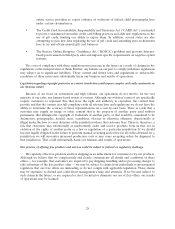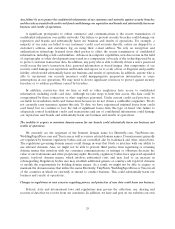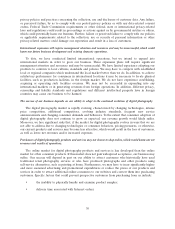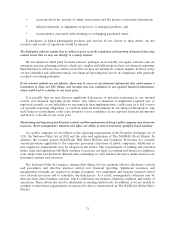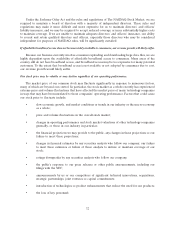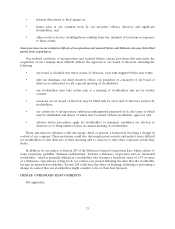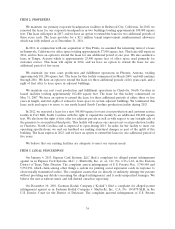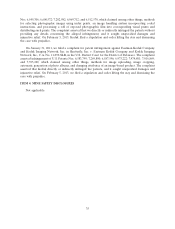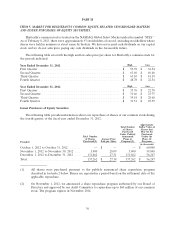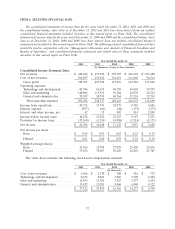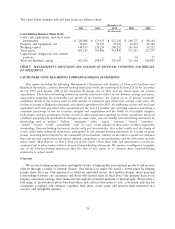Shutterfly 2012 Annual Report Download - page 30
Download and view the complete annual report
Please find page 30 of the 2012 Shutterfly annual report below. You can navigate through the pages in the report by either clicking on the pages listed below, or by using the keyword search tool below to find specific information within the annual report.online service providers to report evidence of violations of federal child pornography laws
under certain circumstances.
• The Credit Card Accountability, Responsibility and Disclosure Act (‘‘CARD Act’’) is intended
to protect consumers from unfair credit card billing practices and adds new regulations on the
use of gift cards, limiting our ability to expire them. In addition, several states are also
attempting to pass new laws regulating the use of gift cards and amending state escheatment
laws to try and obtain unused gift card balances.
• The Restore Online Shoppers’ Confidence Act (‘‘ROSCA’’) prohibits and prevents Internet-
based post-transaction third party sales and imposes specific requirements on negative option
features.
The costs of compliance with these regulations may increase in the future as a result of changes in the
regulations or the interpretation of them. Further, any failures on our part to comply with these regulations
may subject us to significant liabilities. Those current and future laws and regulations or unfavorable
resolution of these issues may substantially harm our business and results of operations.
Legislation regarding copyright protection or content interdiction could impose complex and costly constraints on
our business model.
Because of our focus on automation and high volumes, our operations do not involve, for the vast
majority of our sales, any human-based review of content. Although our websites’ terms of use specifically
require customers to represent that they have the right and authority to reproduce the content they
provide and that the content is in full compliance with all relevant laws and regulations, we do not have the
ability to determine the accuracy of these representations on a case-by-case basis. There is a risk that a
customer may supply an image or other content that is the property of another party used without
permission, that infringes the copyright or trademark of another party, or that would be considered to be
defamatory, pornographic, hateful, racist, scandalous, obscene or otherwise offensive, objectionable or
illegal under the laws or court decisions of the jurisdiction where that customer lives. There is, therefore, a
risk that customers may intentionally or inadvertently order and receive products from us that are in
violation of the rights of another party or a law or regulation of a particular jurisdiction. If we should
become legally obligated in the future to perform manual screening and review for all orders destined for a
jurisdiction, we will encounter increased production costs or may cease accepting orders for shipment to
that jurisdiction. That could substantially harm our business and results of operations.
Our practice of offering free products and services could be subject to judicial or regulatory challenge.
We regularly offer free products and free shipping as an inducement for customers to try our products.
Although we believe that we conspicuously and clearly communicate all details and conditions of these
offers — for example, that customers are required to pay shipping, handling and/or processing charges to
take advantage of the free product offer — we may be subject to claims from individuals or governmental
regulators that our free offers are misleading or do not comply with applicable legislation. These claims
may be expensive to defend and could divert management’s time and attention. If we become subject to
such claims in the future, or are required or elect to curtail or eliminate our use of free offers, our results
of operations may be harmed.
28


